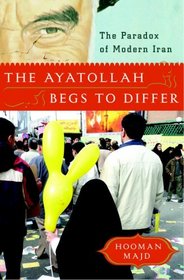Iran for many Americans, myself included, is a black box with occasional outputs such as: "hostage crisis," "nuclear power," "Axis of Evil," and the "2009 elections." The Ayatollah Begs to Differ offers an illuminating glimpse into the inner workings of the only Shia theocracy in the world. Hooman Majd, the grandson of an Ayotollah and the son of an Iranian diplomant, is uniquely qualified to hold the torchlight as "100% Iranian and 100% American."
Some might not like the rambling style in which Majd intersperses social and political analysis with his travels through Iran, but if one imagines him as a goofy uncle taking you on a tour of the country and explaining the culture in context, it's a pleasant journey. Majd has insider access to places most wouldn't see as a tourist in Iran--the presidential offices, the middle-class home with an opium-smoking patriarch, swank parties among the Westernized set, and the residence of the Iranian ambassador to the UN in New York. However, due to his family ties he is closest to former president Khatami and the upper class in north Tehran. There's no mention of Mousavi. But there are glimpses of everyday life in contact with female taxi-drivers and a pretty female government employee asking if he's had sex in the last year before he can donate blood during the holy month of Moharram.
Taken together, Majd describes Iran as a Muslim country, as well as a Persian one. Majd's desciption of ta'arouf, an exaggerated complex social Art-of-War-esque ritual of self-depreciation in favor of the other, and haq, the concept of rights, makes seemingly bizarre political moments more interpretable. The author's exploration of the Persian concept of privacy, with much permitted behind Persian walls in the pairidaeza (Old Persian for cloistered garden, origin of the word paradise), show how the people actually live in the private sphere. In short, The Ayatollah Begs to Differ makes Iran and Iranians seem less foreign, more familiar, and more nuanced. I would recommend this book to anyone who wants to understand the context in which current events are developing, Shia Islam, and the history and culture of a very ancient part of the world.




